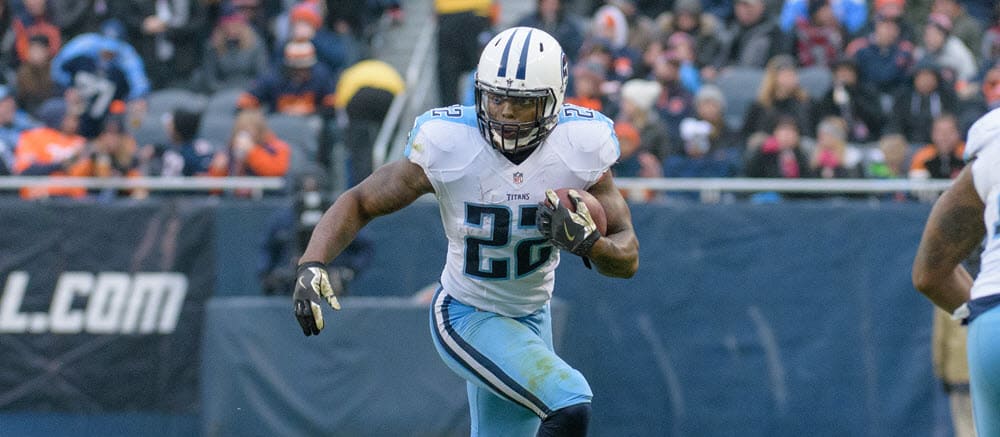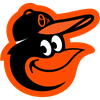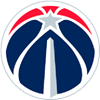Derrick Henry was not the 13th best fantasy football running back last season.
But that's where he finished according to traditional rankings.
That highlights a pervasive problem with traditional rankings. And since the previous season's traditional rankings are often the starting point for the upcoming season's projections, we would do well to have a better method for ranking fantasy producers.
Examining Henry
Henry kicked off the season with a six-game snoozefest. He averaged just 4.3 points per week (5.0 in PPR). He failed to reach six points in any game. In fantasy leagues, he was frequently dropped or traded for scraps. Some held on due to his lofty draft cost and his 12 carries per game, but no one trusted him.
Henry scored a TD in each of the next three games – in fact, he scored two in Week 10 – though few started him for those performances. In two of those games, the TDs barely salvaged otherwise disastrous 33- and 27-yard outings. At the end of Week 10, Henry still had not rushed for 60 yards in a game. His touches per game had decreased slightly through the season.
It was not until Week 14, the first week of the fantasy playoffs, that Henry finally topped 60 yards in a game. He ran for 238 yards and four TDs. That one game accounted for 26 percent of his fantasy points for the entire season, and he played 16 games. Because he had been so bad until that point,
Derrick Henry was not the 13th best fantasy football running back last season.
But that's where he finished according to traditional rankings.
That highlights a pervasive problem with traditional rankings. And since the previous season's traditional rankings are often the starting point for the upcoming season's projections, we would do well to have a better method for ranking fantasy producers.
Examining Henry
Henry kicked off the season with a six-game snoozefest. He averaged just 4.3 points per week (5.0 in PPR). He failed to reach six points in any game. In fantasy leagues, he was frequently dropped or traded for scraps. Some held on due to his lofty draft cost and his 12 carries per game, but no one trusted him.
Henry scored a TD in each of the next three games – in fact, he scored two in Week 10 – though few started him for those performances. In two of those games, the TDs barely salvaged otherwise disastrous 33- and 27-yard outings. At the end of Week 10, Henry still had not rushed for 60 yards in a game. His touches per game had decreased slightly through the season.
It was not until Week 14, the first week of the fantasy playoffs, that Henry finally topped 60 yards in a game. He ran for 238 yards and four TDs. That one game accounted for 26 percent of his fantasy points for the entire season, and he played 16 games. Because he had been so bad until that point, he was started in less than 15 percent of leagues for that eruption.
According to ESPN's Tristan Cockcroft, among players whose ADP was inside the top 100, Henry was the 10th-least common player on fantasy playoff teams. He had two great games, six pretty good games (9-18 points) and eight actively bad games (less than six points). In most cases, he harmed the teams that drafted him.
Henry was neither the 13th nor 15th best fantasy RB last season. Yet that's where he finished according to traditional ranking systems in standard and PPR, respectively. When anyone in the fantasy world – pros, analysts and hobbyists alike – refers to a player's final ranking for a season, the default understanding is that they are referencing the player's season-long total output.
Henry is a perfect example of why that system of ranking players is misleading at best, and harmful at worst.
Alternatives to Season Totals
The most obvious alternative ranking system would be to rely on a player's average weekly output.
Ranking by weekly averages has some big advantages. Almost every fantasy player would rather a WR who scored 140 points in 14 weeks (10 points per week) over a WR who scored the same amount in 16 weeks (8.8 points per week), as long as the weeks missed weren't in the fantasy playoffs. With weekly average rankings, Henry gets fairly punished for all his bad weeks. It provides a more apples-to-apples comparison.
However, ranking by weekly averages also has two giant flaws. Leonard Fournette's 12.30 points per game last season was a solid output, but he only played in eight games. He should not be ranked ahead of David Johnson, who played all 16 games and averaged 12.29 points per game. As they say, "the most important ability is availability."
Second, ranking by weekly average is still susceptible to one or two random great games, and this problem gets worse the more games a player misses. Amari Cooper's 2017 season was similar to Henry's 2018, except Cooper missed two games that year. Cooper scored 33 points in one game, had three games in the teens and scored single-digit fantasy points in his other 10 games. Worse still, Cooper had four games with less than one point during that campaign. In a season like that, ranking by weekly averages rewards Cooper for his two missed games. Cooper finished that season 26th in average fantasy points per game. If he had two more mediocre games, instead of sitting out entirely, he would have finished deep in the 30s.
We need something new. We need a better way to rank fantasy performance.
Success Rankings
Fantasy managers' primary interest is in whether a player outscores other players at his position week to week. That notion should be the core of any fantasy rankings system. In traditional fantasy leagues, a player who finishes as a borderline top-12 RB every week is more valuable than someone who finishes No. 1 at the position once but spends the rest of the season doing almost nothing.
So I've set out to develop a new ranking system that better values each player's weekly productivity. These new rankings only reward players when they are active, and they are resistant to extreme outlier weeks.
How it works: each week, a player gets a score based on how they performed. Last season, an RB generally needed to score at least 14.7 points to finish in the top 12 of any given week. Therefore, each time an RB scored at least 14.7 fantasy points, he was awarded the maximum four Success Points. The RB then receives three Success Points for each week he scored 9.3 to 14.6 – a typical RB2 finish. Then two points for an RB3 performance … You get the idea.
For this ranking system, I treated Week 17 as though it simply did not exist – which is exactly how your fantasy league should treat Week 17.
2018 RB Success Rankings
Threshold for weekly RB1 performance: 14.7
Threshold for weekly RB2 performance: 9.3
Threshold for weekly RB3 performance: 5.6
Threshold for weekly RB4 performance: 3.1
The "Success Boost" column shows how much a player's ranking increased in the Success Rankings compared to the player's traditional ranking.
Players with fewer than 16 games are also highlighted.
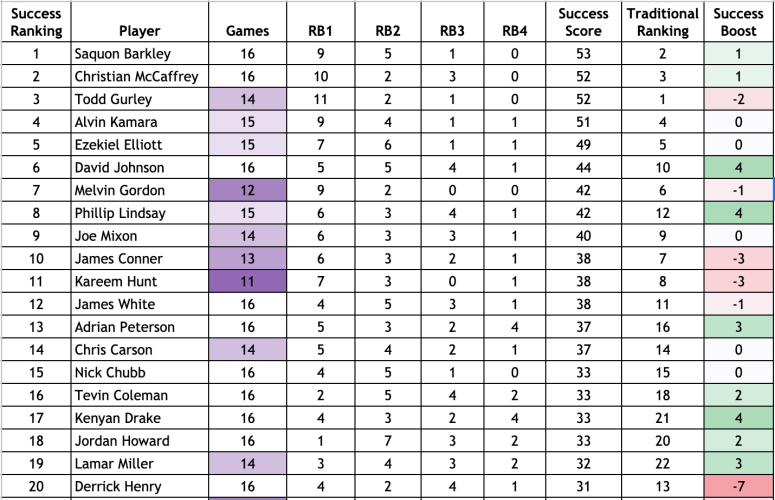
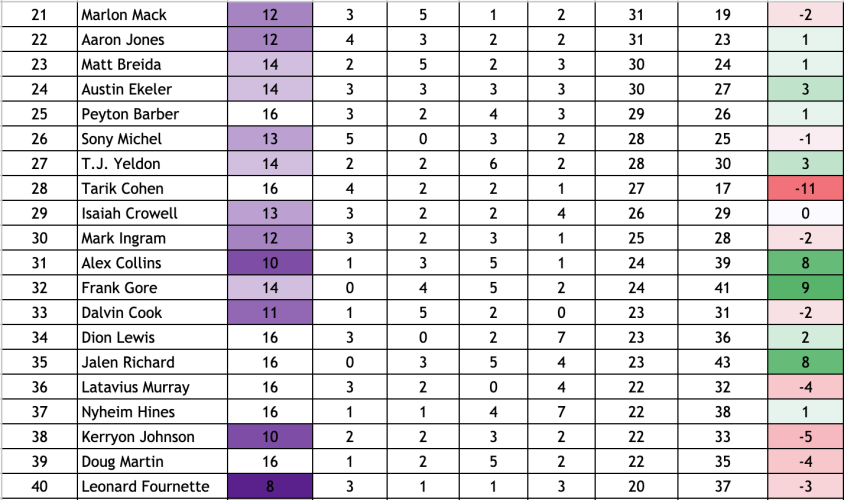

Takeaways – The Losers
As expected, the Success Rankings show that Derrick Henry was not the 13th best RB in 2018. But there is more we can learn here.
Derrick Henry, Tarik Cohen and Mike Davis were the three biggest losers in the Success Rankings. Most in the fantasy community remember Henry's roller-coaster season and know that his season totals are heavily inflated by two outlier games. It is not nearly as well known that Cohen and Davis had somewhat similar seasons.
Cohen is widely regarded as a solid and somewhat stable RB selection. His ADP is 29. A cursory glance at his 2018 shows that he had a run during which he scored double-digit fantasy points in seven of nine games – ostensibly an indication of a steady producer.
However, upon noticing how little the Success Rankings thought of him, I dove a little deeper. Only once did he score more than 6.8 fantasy points without scoring a TD. Half of his eight total TDs were on plays longer than 10 yards. It takes impressive talent for a player his size to score four touchdowns from outside the 10-yard line, including two from outside the 20, but those breakout plays cannot be counted on week to week. Cohen is a high risk, high-reward gamble, not a steady producer.
Davis, who will now back up Cohen in Chicago, had a season more similar to Henry. Davis had a short-lived run during which he put up solid numbers as Seattle's primary RB, and only once topped 60 total yards outside of that stretch. Like Henry, Davis had a single game account for a gigantic proportion of his total production (Davis' 124 total yards in Week 4 accounted for 17 percent of his season totals).
The Success Rankings highlight that Henry, Cohen, and Davis might be a bit overrated heading into 2019. What it highlights about Cohen is probably the most concerning – that he is a highly volatile producer, more so than his reputation may imply. If you're looking for a high-upside RB3 or RB4, then Cohen could be a solid choice, but he is a dangerous fit as an RB2 for a team that focused on other positions early in the draft.
Takeaways – The Winners
Hilariously, the biggest winner in the Success Rankings was Frank Gore. He is the highest ranked player without a single week as an RB1. He will be logging 50 yards a game 16 games a season long after all of us are dead.
The next crop of winners surprised me. Alex Collins and Jalen Richard saw massive eight-spot jumps compared to their standard rankings, Duke Johnson's rank increased by five, and David Johnson, Phillip Lindsay and Kenyan Drake all rose four spots. What did those players have in common?
All provided at least a little bit of help in the passing game, and Richard, Duke Johnson, David Johnson and Drake are heavily used pass-catchers. All five led their team in RB snaps.
Compare that to the biggest losers in the Success Rankings. After Henry, Cohen and Davis, Kerryon Johnson, Latavius Murray and Doug Martin were the biggest losers. Those losers are split on their receiving abilities – Henry and Martin catch like they're wearing oven mitts, while Cohen, Davis and Kerryon Johnson are highly capable receivers. While some of these players led their teams in carries, none of the six biggest losers led his team in RB snaps.
Traditional season-totals rankings seem to overrate secondary RBs. If a manager is looking for steadier weekly production, snap counts – not carries – is where they should focus their attention.
Takeaways – Games Played
One last observation: this ranking is dominated by guys who played 15 or 16 games. That makes sense. It's supposed to do that.
In that light, it's worth noting the players who did well in the Success Rankings despite playing 12 games or fewer. These are players who, if they can stay healthy in 2019, would presumably be among the best fantasy RBs.
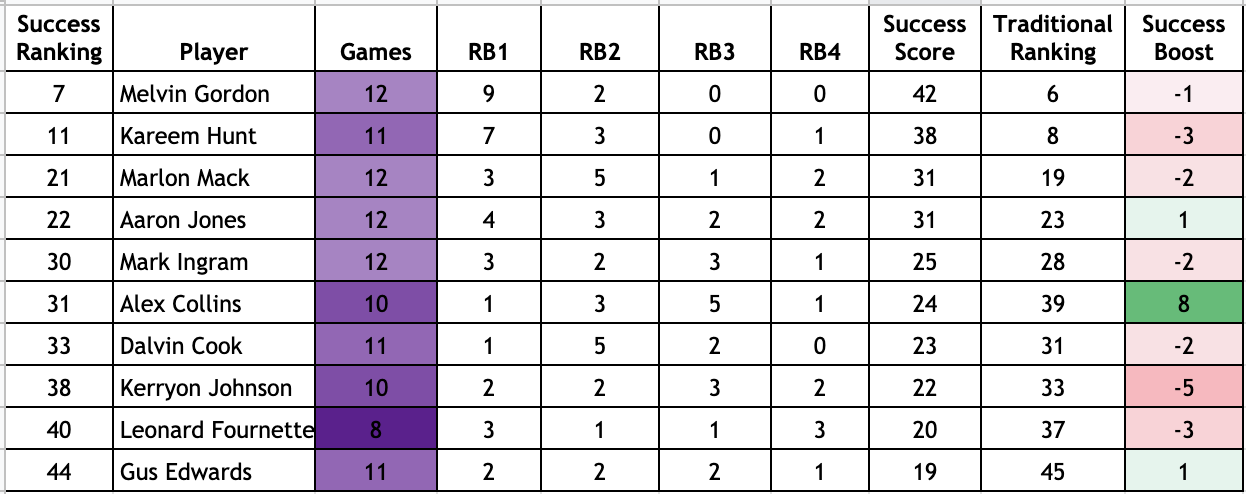
Melvin Gordon (assuming he and the Chargers resolve their contract dispute), Marlon Mack, Aaron Jones, Dalvin Cook, Kerryon Johnson and Leonard Fournette are returning to their same teams in 2019. All appear set to lead their backfield in snaps. If they can stay healthy, they should shoot up the 2019 Success Rankings.
Mark Ingram is probably the most interesting name listed on that chart. Two 2018 Ravens RBs appear above, which likely says more about the Ravens' system than it does about Alex Collins or Gus Edwards. Ingram, who qualified for the list while on a different team, is set to take over as the Ravens' leading RB.
TL;DR
The fantasy community traditionally relies on season totals when ranking a player's season. "Derrick Henry finished 2018 as the 13th best RB" means he had the 13th-most total fantasy points over the course of the season. That ranking system is often misleading.
Instead, we should use Success Rankings, a system of ranking players that is less impacted by extreme outlier weeks and that focuses on week-to-week production.
Using Success Rankings instead of traditional season-totals rankings to analyze RBs, a few trends jump out. First, traditional rankings frequently overrate RBs who did not lead their team in snaps. Second, Success Rankings seems to indicate that RBs with at least moderate pass-catching abilities are more reliable for repeatable fantasy success. This second conclusion is potentially contrary to popular perception.
Finally, Success Rankings seem to indicate that the following players could be in line for excellent seasons if they are able to remain healthy and active: Melvin Gordon, Marlon Mack, Aaron Jones, Dalvin Cook, Kerryon Johnson, Leonard Fournette and Mark Ingram.


